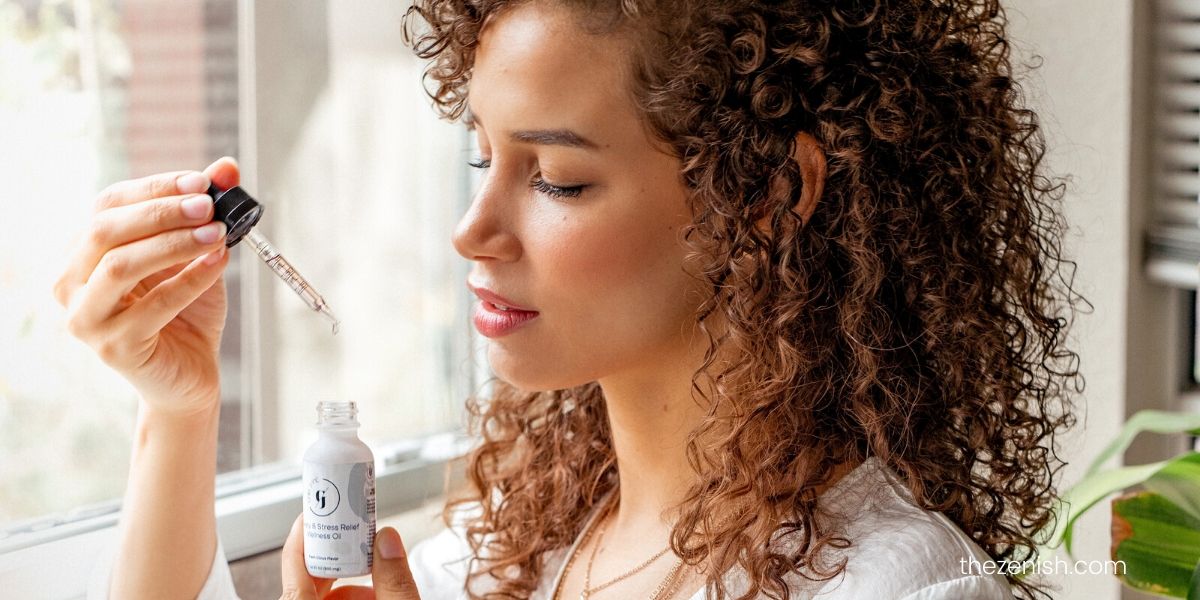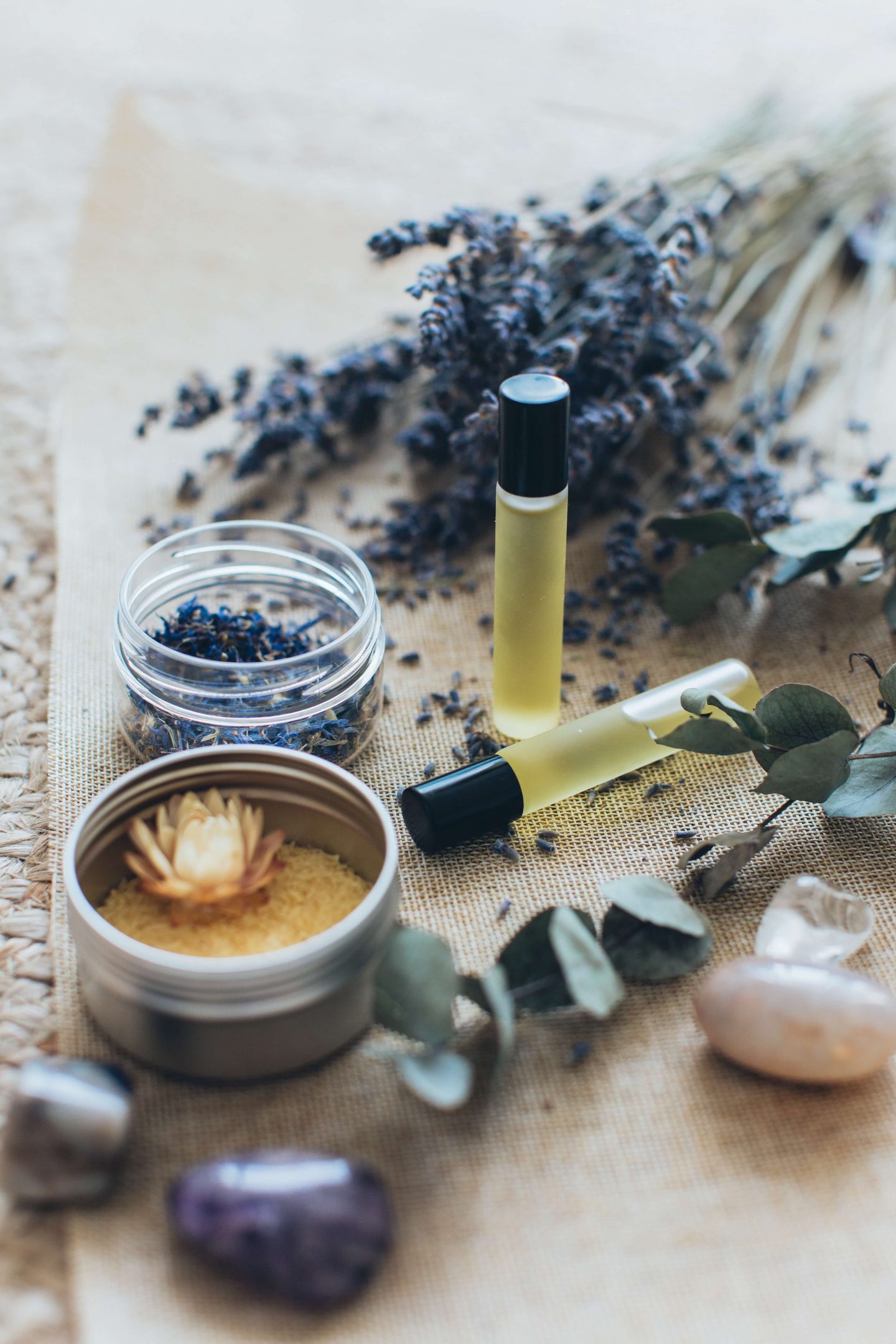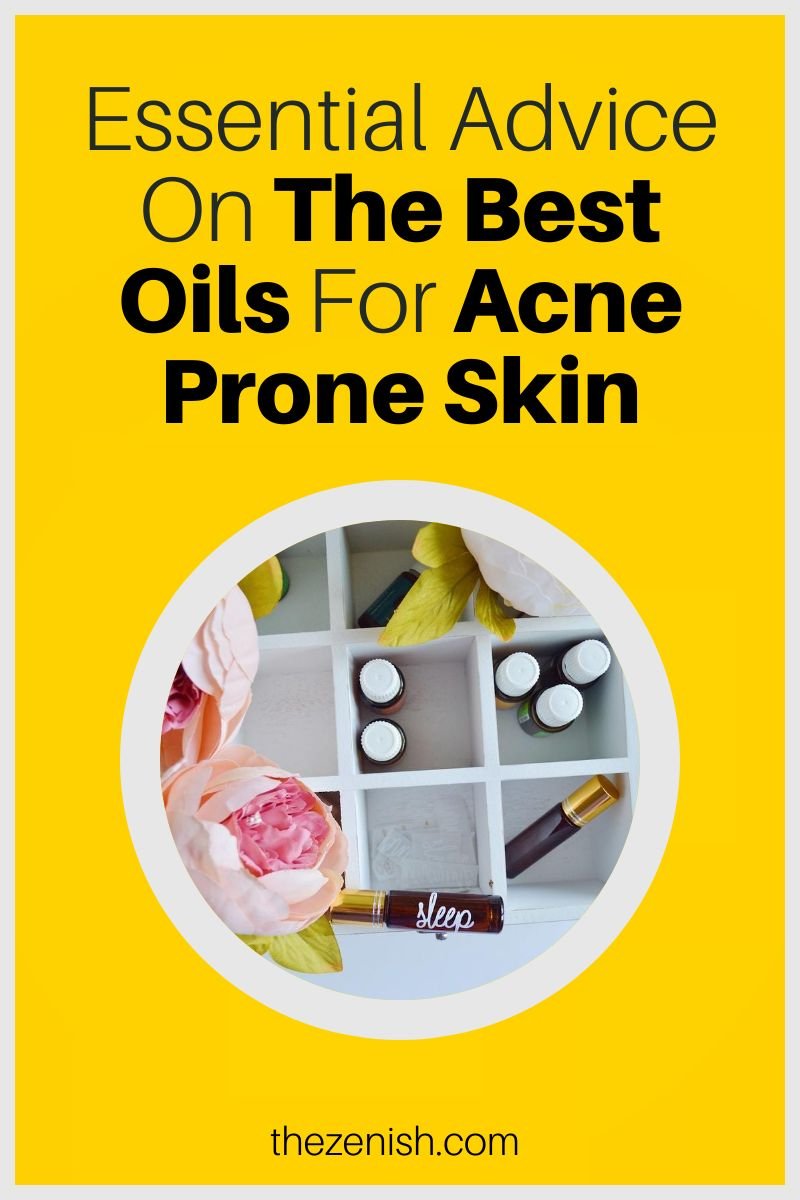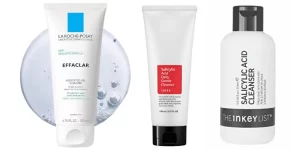
If you have acne-prone skin, you might think that using oils on your face is a big no-no.
And you’ve probably found yourself wondering more often than not “Can acne prone skin use oils?”
After all, you don’t want to add more oil to your already oily skin.
Wrong!
Oils can actually be your best friend when it comes to fighting acne and keeping your skin healthy and hydrated.
But not all oils are created equal, and some oils can do more harm than good for your skin.
So how do you know which oils to use and which ones to avoid?

And how do you incorporate oils into your skincare routine without making your skin greasy or clogging your pores?
Don’t worry, I’ve got you covered.
In this article, I’ll explain everything you need to know about using oils for acne-prone skin, including:
- The benefits of using oils for acne-prone skin
- The difference between comedogenic and non-comedogenic oils
- The best oils for acne-prone skin (and the ones to stay away from)
- How to use oils for acne-prone skin (and how much to use)
Ready to discover the amazing power of oils for acne-prone skin?
Let’s dive in!
| this post may contain affiliate links, which means if you purchase from one of these links, I may receive a small commission at no additional cost to you. |
Related Posts
The Benefits of Using Oils for Acne-Prone Skin
You might be wondering why you should use oils for acne-prone skin in the first place.
Aren’t oils bad for acne?
Actually, no.
Oils can be fantastic for acne-prone skin, as long as you’re using the right ones.
Here are some of the benefits of using oils for acne-prone skin:
Oils can moisturize your skin without clogging your pores.
Many moisturizers contain synthetic ingredients that can irritate your skin or cause breakouts.
Oils, on the other hand, are natural and can penetrate your skin deeper than creams or lotions.
They can also help seal in moisture and prevent water loss from your skin, which is vital for keeping your skin barrier healthy and strong.
Oils can balance your skin’s natural oil production
Contrary to popular belief, using oils on your skin won’t make it oilier. In fact, it can do the opposite.
When your skin is dry or dehydrated, it can overproduce sebum (your natural oil) to compensate.
This can lead to more shine, enlarged pores, and more breakouts.
By using oils on your skin, you can help regulate your sebum production and keep it at a healthy level.
Oils can heal and protect your skin
Many oils have anti-inflammatory, antibacterial, antifungal, and antioxidant properties that can help heal and prevent acne infections, reduce redness and inflammation, soothe irritation and sensitivity, and protect your skin from environmental damage and premature aging.
Oils can improve the appearance of your skin
Oils can also help improve the texture and tone of your skin by smoothing out fine lines and wrinkles, fading acne scars and hyperpigmentation, brightening dullness and unevenness, and boosting collagen and elasticity.
As you can see, oils can do wonders for your acne-prone skin. But not all oils are equally beneficial.
Some oils can actually clog your pores and cause more breakouts.
That’s why you need to know the difference between comedogenic and non-comedogenic oils.
The Difference Between Comedogenic and Non-Comedogenic Oils
Comedogenic means any ingredient that will cause acne by clogging your pores. Non-comedogenic means any ingredient that will not clog your pores.
If you have acne-prone skin, you want to use non-comedogenic oils and avoid comedogenic ones.
But how do you know which oils are comedogenic and which ones are non-comedogenic?
One way to tell is by looking at the comedogenic rating of oils. This is a scale from 0 to 5 that indicates how likely an oil is to clog your pores.
The higher the number, the more comedogenic the oil is. The lower the number, the less comedogenic the oil is.
Here’s what the comedogenic rating means:
– 0 – won’t clog pores at all
– 1 – very low likelihood of clogging pores
– 2 – moderately low likelihood
– 3 – moderate likelihood
– 4 – fairly high likelihood
– 5 – high likelihood of clogging pores
For best results, acne-prone skin should use oils with a 0-1 rating; anything higher may clog pores and cause more breakouts.
But keep in mind that the comedogenic rating is not a definitive guide. Everyone’s skin is different, and some oils might work better or worse for you than others.
The best way to find out if an oil suits your skin is to patch-test it first.
Apply a small amount of oil on a discreet area of your skin, like behind your ear or on your jawline, and wait for 24 hours to see if you have any reaction.
If you don’t have any irritation, redness, or breakouts, you can proceed to use the oil on your face.
If you do have any adverse reactions, stop using the oil and try another one.
The Best Oils for Acne-Prone Skin (And the Ones to Stay Away From)
Now that you know how to choose non-comedogenic oils for acne-prone skin, let’s look at some of the best oils you can use and some of the ones you should avoid.
Here are some of the best oils for acne-prone skin:
Jojoba oil
This is one of my favorite oils for acne-prone skin because it’s very similar to the sebum that your skin produces.
It’s lightweight, absorbs easily, and doesn’t leave a greasy residue. It can help balance your skin’s oil production, unclog your pores, and moisturize your skin without clogging it.
It’s also a great carrier oil that you can mix with other oils or essential oils for acne. Comedogenic rating: 2
Tea tree oil
This is a popular ingredient used in acne products due to its natural antibacterial and antifungal properties, as well as its anti-inflammatory effects.
It can help kill acne-causing bacteria, reduce inflammation and swelling, and speed up healing. However, tea tree oil is very potent and can be irritating if used undiluted.
You should always dilute it with a carrier oil like jojoba oil before applying it to your skin. Comedogenic rating: 2
Rosehip seed oil
This is another amazing oil for acne-prone skin because it’s rich in antioxidants, vitamin C, and essential fatty acids that can help repair sun damage, reduce the appearance of scars, and promote collagen synthesis.
It’s also moisturizing, anti-inflammatory, and brightening.
However, rosehip seed oil can be too stimulating for some people, so you should use it in a lower percentage (10%-20%) in another carrier oil. Comedogenic rating: 1
Grape seed oil
This is a light and gentle oil that has antibacterial and anti-inflammatory properties.
It’s high in linoleic acid, which can help treat existing acne infections and prevent new ones from forming.
It’s also a good source of vitamin E, which can help protect your skin from oxidative stress and environmental damage. Comedogenic rating: 1
Hemp seed oil
This is a very nourishing oil that has a high content of omega-6 and omega-3 fatty acids, antioxidants, vitamins, and minerals.
It can help reduce the appearance of scars, reduce redness and inflammation, and promote healing.
It doesn’t clog pores and can be used as a daily moisturizer. Comedogenic rating: 0
Here are some of the oils to avoid if you have acne-prone skin:

Coconut oil
This is one of the most comedogenic oils out there, with a rating of 4. It’s very thick and heavy, and can easily clog your pores and cause breakouts.
It might work for some people with very dry skin, but it’s not recommended for acne-prone skin.
Olive oil
This is another comedogenic oil with a rating of 3.
It’s also very dense and greasy and can trap dirt and bacteria in your pores. It might be good for cooking or salad dressing, but not for your face.
Almond oil
This is a moderately comedogenic oil with a rating of 2-3. It’s high in oleic acid, which can be too rich and occlusive for acne-prone skin.
It might work for some people with dry or mature skin, but it can cause breakouts for others.
Other oils to avoid:
Apricot kernel oil (rating: 2), avocado oil (rating: 3), carrot seed oil (rating: 3-4), chia seed oil (rating: 3), corn oil (rating: 3), cottonseed oil (rating: 3), flaxseed oil (rating: 4), palm oil (rating: 4), peach kernel oil (rating: 2), peanut oil
Can acne prone skin use oils?
How to Use Oils for Acne-Prone Skin (And How Much to Use)
Now that you know which oils are good and bad for acne-prone skin, you might be wondering how to use them in your skincare routine.
Here are some tips on how to use oils for acne-prone skin:
– Cleanse your skin first. Before applying any oil to your face, you should always cleanse your skin with a gentle cleanser that suits your skin type.
This will remove any dirt, makeup, or excess oil that might interfere with the absorption of the oil or cause breakouts.
– Tone your skin second. After cleansing, you should apply a toner that balances your skin’s pH and prepares it for the oil.
Depending on your skin’s needs, you can use a hydrating toner, a soothing toner, or an exfoliating toner.
Choose a toner without harsh ingredients, such as alcohol, which can irritate and dry out your skin.
– Apply the oil third. After toning, you can apply the oil to your face. You can use the oil alone or mix it with another oil or essential oil for acne.
You can also add a few drops of oil to your moisturizer or serum and apply them together.
The amount of oil you need depends on your skin type and the oil you’re using, but generally, a few drops are enough.
You don’t want to use too much oil or it might make your skin greasy or clog your pores.
– Massage the oil gently. When applying the oil, you should massage it gently into your skin using circular motions.
This will help the oil penetrate deeper into your pores and stimulate blood circulation and lymphatic drainage.
It will also relax your facial muscles and reduce stress and tension.
– Let the oil absorb fully. After applying the oil, you should wait for a few minutes to let it absorb fully into your skin.
You can also use a warm towel or a facial steamer to open up your pores and enhance the absorption of the oil.
Don’t wipe off any excess oil with a tissue or a cotton pad, as this will waste the product and remove its benefits.
– Use oils twice a day. You can use oils for acne-prone skin twice a day, in the morning and at night.
In the morning, you can use a lighter oil that won’t make your skin shiny or interfere with your makeup. At night, you can use a richer oil that will nourish and repair your skin while you sleep.
FAQs About Oils for Acne-Prone Skin
Can I use oils if I have oily skin?
Yes, you can use oils if you have oily skin, as long as you use non-comedogenic oils that won’t clog your pores and cause breakouts.
However, you may still get breakouts, especially if you’re already prone to them.
Oils can help balance your skin’s oil production, moisturize your skin without clogging it, and heal and protect your skin from acne infections and damage.
However, you should use oils sparingly and in moderation, and always cleanse your skin before and after applying oils.
How do I know if an oil is comedogenic or non-comedogenic?
One way to tell is by looking at the comedogenic rating of oils. This is a scale from 0 to 5 that indicates how likely an oil is to clog your pores.
The higher the number, the more comedogenic the oil is. The lower the number, the less comedogenic the oil is. Acne-prone skin should use oils with a 0-1 rating for the best results.
Anything higher might clog your pores and cause more breakouts.
But keep in mind that the comedogenic rating is not a definitive guide.
Everyone’s skin is different, and some oils might work better or worse for you than others.
The best way to find out if an oil suits your skin is to patch test it first on a discreet area of your skin and wait for 24 hours to see if you have any reaction.
What are some of the best oils for acne-prone skin?
Some of the best oils for acne-prone skin are jojoba oil, tea tree oil, rosehip seed oil, grape seed oil, and hemp seed oil.
These oils are lightweight, absorb easily, and have anti-inflammatory, antibacterial, antifungal, and antioxidant properties that can help treat and prevent acne infections, reduce inflammation and swelling, soothe irritation and sensitivity, and protect your skin from environmental damage and premature aging.
They also have a low comedogenic rating of 0-2.
What are some of the worst oils for acne-prone skin?
Some of the worst oils for acne-prone skin are coconut oil, olive oil, almond oil, and other oils that are high in oleic acid or have a high comedogenic rating of 3-5.
These oils are thick and heavy, and can easily clog your pores and cause breakouts.
They might work for some people with very dry or mature skin, but they are not recommended for acne-prone skin.
How do I use oils for acne-prone skin?
You can use oils for acne-prone skin as a moisturizer or a serum after cleansing and toning your skin.
You can use the oil alone or mix it with another oil or essential oil for acne.
You can also add a few drops of oil to your moisturizer or serum and apply them together.
The amount of oil you need depends on your skin type and the oil you’re using, but generally, a few drops are enough.
You don’t want to use too much oil or it might make your skin greasy or clog your pores.
You should massage the oil gently into your skin using circular motions and let it absorb fully before applying any other products or makeup.
You can use oils twice a day, in the morning and at night.
Final Thoughts
Oils are not the enemy of acne-prone skin. In fact, they can be one of the best allies for keeping your skin clear, healthy, and glowing.
But not all oils are suitable for acne-prone skin. You need to choose non-comedogenic oils that won’t clog your pores and cause breakouts.
You also need to know how to use oils for acne-prone skin correctly and how much to use.
By following these tips, you can enjoy the benefits of oils for acne-prone skin without any drawbacks.
I hope you found this article helpful and informative. If you did, please share it with your friends and family who might benefit from it.
And don’t forget to leave me a comment below and let me know what you think.
Have you tried using oils for acne-prone skin? Which ones are your favorites? Which ones do you avoid?




